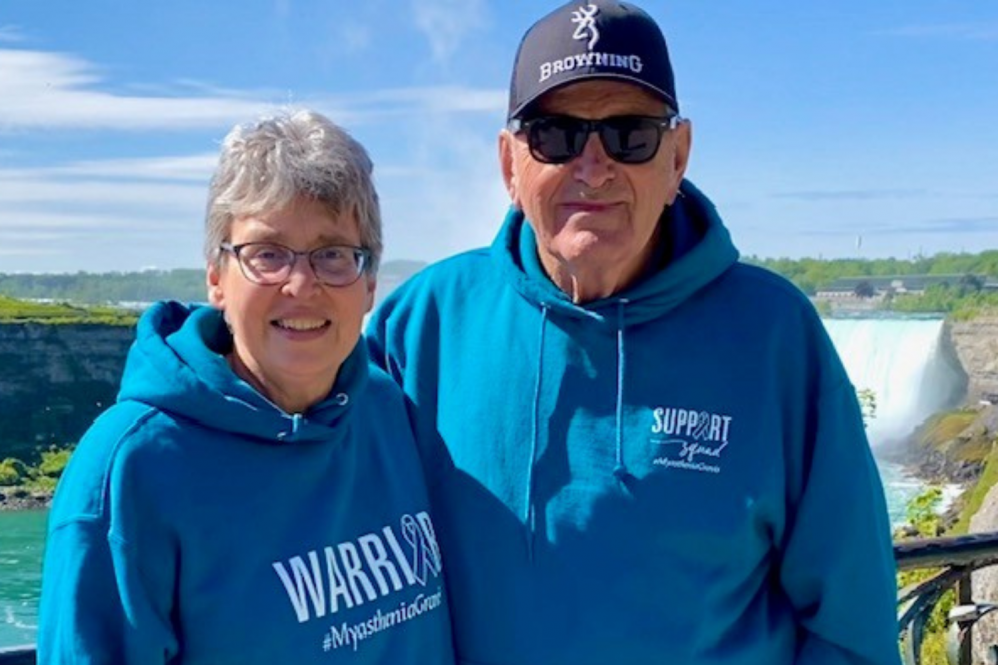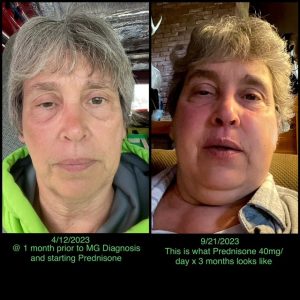UConn Health's Comprehensive Myasthenia Gravis Program is helping patients rediscover strength and independence through advanced, compassionate care. For many, it's more than treatment - it's getting their life back.

Nancy and Beau Nye at Niagara Falls June 2025 for Myasthenia Gravis Awareness Month
At UConn Health's Neuromuscular Center, patients living with myasthenia gravis (MG) find more than just expert care; they find renewed strength, understanding, and hope.
MG is an autoimmune disorder in which the immune system attacks the connection between nerves and muscles, blocking the signals that allow movement. This disruption leads to muscle weakness that can appear suddenly and fluctuate throughout the day. For some, it causes double vision or drooping eyelids, while others experience difficulty swallowing, breathing, or walking. With proper treatment, most patients can regain strength and lead full lives.
At the center of this work is Dr. Amanda Hernandez, division chief of Neuromuscular Medicine, whose passion for myasthenia gravis has shaped UConn Health's Comprehensive MG program. Drawing on her dual background in neurology and immunology, Dr. Hernandez brings a uniquely scientific and compassionate approach to the disorder, one that blends advanced treatment, patient advocacy, and education.
"Many patients come to us after years of being misdiagnosed or misunderstood," Hernandez explains. "MG symptoms can be subtle or mistaken for other conditions. Our goal is to provide a clear diagnosis, effective treatment, and the confidence that patients are in the right place."
One of those patients is Nancy Nye, who resides in Maine and is a retired nurse and proud UConn School of Nursing alumna. She first began experiencing double vision and profound fatigue that made even everyday tasks difficult.
When Nye's right eye first began to droop in 2021, she chalked it up to stress, aging, or perhaps a side effect of her COVID booster. An eye doctor assured her it was nothing to worry about. But months later, the drooping worsened, and she knew something wasn't right.
"It started with my vision getting blurry, and I just didn't feel like myself," Nye recalls. "I went to the emergency room in Florida, where they tested me for a stroke and brain tumor, but everything came back normal."
By the time she returned home to Maine, her symptoms had progressed, and she struggled to walk upstairs, lift her arms to dry her hair, or even swish water in her mouth.
"You learn to adapt," Nye says. "You pull a grocery cart instead of pushing it, or you wash your hair one hand at a time. You think you're doing fine until you realize how much you've changed your life just to cope."

Her treatment began with high-dose prednisone and an immunosuppressant used for transplant patients. "It helped some, but I was on 40 milligrams of prednisone a day. I gained weight, my voice was raspy, and I felt like I was losing myself," Nye says. She also began receiving IVIG infusions, blood plasma treatments that helped temporarily but required long, exhausting eight-hour sessions.
By summer 2025, Nancy knew she needed a new approach. She came to UConn Health, where she finally found answers along with possibilities of more targeted MG treatments.
"I had been struggling for so long and felt like I hit a wall in treatment options," Nye recalls. "When I met Dr. Hernandez, everything changed. She explained myasthenia gravis and treatment options in a way that made sense, and I felt real hope for the first time."
The clinic's team model ensures that comprehensive care happens across a series of coordinated visits. Patients have the opportunity to meet not only with Hernandez but also with a dedicated social worker along with nurses, rehabilitation specialists, and collaborating experts in ophthalmology, who help manage double vision through prism lenses and other interventions. Thoracic surgeon, Dr. Dustin Walters, provides thymectomies for those patients that require them for their type of myasthenia. At the Carol and Ray Neag Comprehensive Cancer Center, their infusion team plays a critical role in administering advanced MG therapies.
These modern treatments have transformed what living with MG looks like. Once reliant on chronic steroid use, many patients today can achieve remission with immune-targeted therapies that reverse disease progression while minimizing side effects.

For the first time in years, Nye felt seen and safe. "With a rare disease like mine, and especially with seronegative MG, you sometimes get gaslighted by doctors or insurance companies. They don't believe you because your tests don't fit the textbook. But Dr. Hernandez never doubted me. She fought for me."
Hernandez and her team, nurses Karen Nelson and Jennifer Pickert among them worked tirelessly for two months to get Nye approved for a targeted immune therapy known as a complement inhibitor, a medication that helps block autoimmune destruction and disruption at the neuromuscular junction When approval finally came through, the care team moved fast.
"I got the approval notice at 7 a.m.," Nye says. "At 10 a.m., Dr. Hernandez called me. I made the trip from Maine and at 1:00 p.m. the next afternoon, I was sitting in an infusion chair at UConn Health getting my first dose."
The treatment involved a loading dose once a week for five weeks, followed by maintenance infusions every two weeks. Nye immediately began to feel stronger. "Within a few days, I could tell something was different," she says. "By my third dose, I hadn't taken any of my symptom medicine all day. I was walking, standing straight, even braiding my dog leashes again."
Nancy's husband now drives her more than 325 miles each way from Maine to Farmington for her infusions.
The clinic's patient population reflects its growing regional reputation. UConn Health now cares for individuals from across Connecticut and neighboring states.
Beyond treatment, the program is committed to education and empowerment. A patient support group and dedicated social work services help individuals navigate both the emotional and practical challenges of MG. In 2026, UConn Health plans to launch new patient education programming to help both patients across New England better understand MG, its symptoms, and its rapidly evolving treatment landscape. A provider education initiative is also in development to improve recognition and care of MG within the Northeast corridor.
UConn Health's Comprehensive MG Program is also looking ahead to two clinical trials slated to begin in 2026 which will soon be open for enrollment and to further advancements in this complex autoimmune disease.

Hernandez envisions positioning UConn Health as a regional center of excellence for myasthenia gravis, expanding its role in personalized medicine and immunotherapy research. "The progress we're seeing in MG gives us tremendous hope for similar breakthroughs in conditions like ALS and muscular dystrophy," she says.
For Nye, the journey has been about more than medicine, it's about reclaiming hope. "Dr. Hernandez is giving me my life back," she says simply. "I know my disease doesn't have a cure. But now, I have control, I have strength, I have hope, and I have a team that will never give up on me."
The Neuromuscular Center at UConn Health specializes in the diagnosis and treatment of neuromuscular disorders that affect the peripheral nerves, muscles, or neuromuscular junction.






